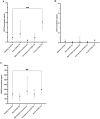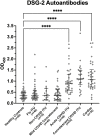SARS-CoV-2 infection is associated with anti-desmoglein 2 autoantibody detection
- PMID: 37095599
- PMCID: PMC10651225
- DOI: 10.1093/cei/uxad046
SARS-CoV-2 infection is associated with anti-desmoglein 2 autoantibody detection
Abstract
Post-acute cardiac sequelae, following SARS-CoV-2 infection, are well recognized as complications of COVID-19. We have previously shown the persistence of autoantibodies against antigens in skin, muscle, and heart in individuals following severe COVID-19; the most common staining on skin tissue displayed an inter-cellular cement pattern consistent with antibodies against desmosomal proteins. Desmosomes play a critical role in maintaining the structural integrity of tissues. For this reason, we analyzed desmosomal protein levels and the presence of anti-desmoglein (DSG) 1, 2, and 3 antibodies in acute and convalescent sera from patients with COVID-19 of differing clinical severity. We find increased levels of DSG2 protein in sera from acute COVID-19 patients. Furthermore, we find that DSG2 autoantibody levels are increased significantly in convalescent sera following severe COVID-19 but not in hospitalized patients recovering from influenza infection or healthy controls. Levels of autoantibody in sera from patients with severe COVID-19 were comparable to levels in patients with non-COVID-19-associated cardiac disease, potentially identifying DSG2 autoantibodies as a novel biomarker for cardiac damage. To determine if there was any association between severe COVID-19 and DSG2, we stained post-mortem cardiac tissue from patients who died from COVID-19 infection. This confirmed DSG2 protein within the intercalated discs and disruption of the intercalated disc between cardiomyocytes in patients who died from COVID-19. Our results reveal the potential for DSG2 protein and autoimmunity to DSG2 to contribute to unexpected pathologies associated with COVID-19 infection.
Keywords: autoantibodies; autoimmunity; infection; virus.
© The Author(s) 2023. Published by Oxford University Press on behalf of the British Society for Immunology.
Conflict of interest statement
Mark T. Drayson owns stock in Abingdon Health, outside the submitted work. All other authors declare no competing interests.
Figures




References
Publication types
MeSH terms
Substances
Grants and funding
LinkOut - more resources
Full Text Sources
Medical
Miscellaneous

